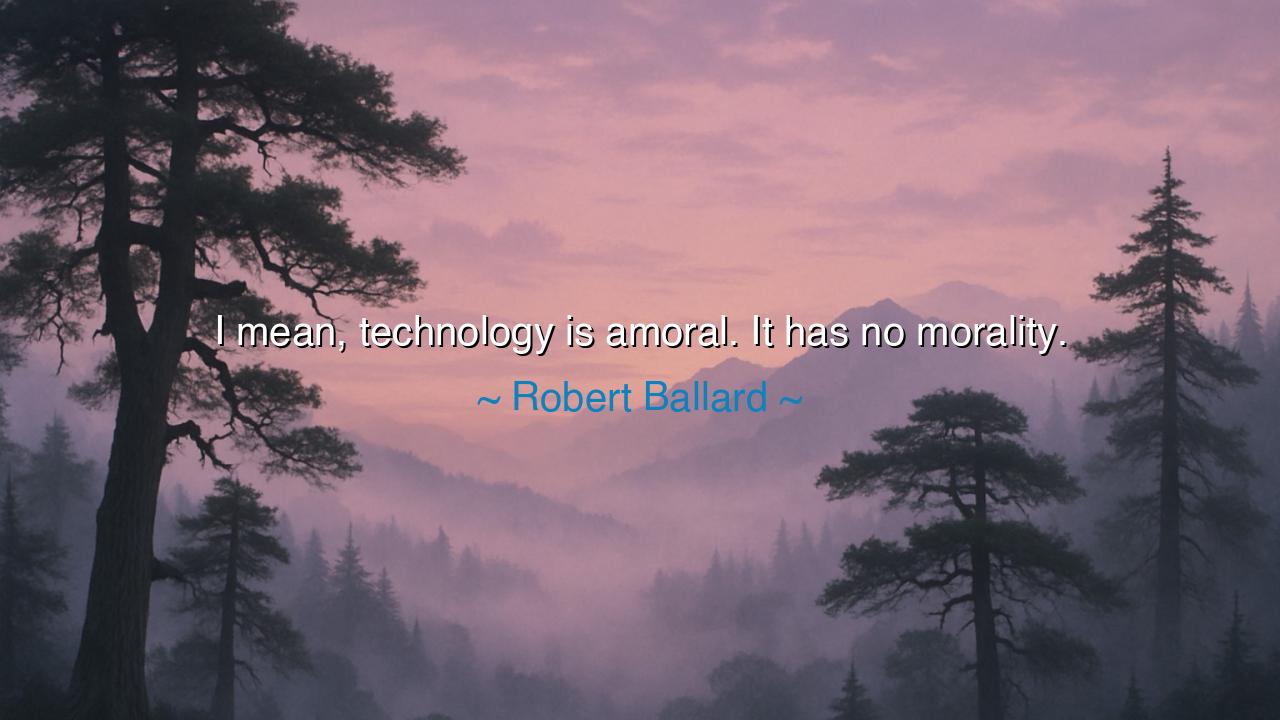
I mean, technology is amoral. It has no morality.






Hear, O seekers of wisdom, the words of Robert Ballard, the man who plumbed the deep and revealed the wreck of the Titanic: “I mean, technology is amoral. It has no morality.” This is no idle saying, but a truth that must be passed from generation to generation. For men often deceive themselves, thinking that their tools are either good or evil. But the hammer does not know whether it builds or destroys. The flame does not know whether it warms or burns. So too with technology—it is but an instrument, a vessel awaiting the will of the hand that guides it.
From the dawn of the human story, this has been so. When the first hunter shaped stone into a blade, he gained the power to feed his people—or to kill his brother. When fire was stolen, it became the hearth of the home, but also the torch of war. In our age, the same truth remains: electricity lights the schoolhouse, but also powers the guillotine. The internet spreads knowledge to millions, but also deceit and cruelty. Ballard’s words are a reminder that technology does not choose the path—it is the human heart that directs it.
Consider, O listeners, the story of Alfred Nobel. He devised dynamite, believing it would make mining and construction safer, lifting burdens from laborers and carving tunnels through mountains. Yet men took his gift and made of it terrible weapons. Shocked by the rivers of blood his invention unleashed, Nobel turned his fortune toward peace, founding the prizes that bear his name. His story shows the truth of Ballard’s saying: technology is neither saint nor sinner. It is the soul of its wielder that bends it toward creation or destruction.
So too in the chronicles of war. The splitting of the atom was at first a triumph of science, a revelation of the hidden laws of the universe. Yet soon it was bound into the service of annihilation at Hiroshima and Nagasaki. And yet again, the same science gave rise to nuclear medicine, saving countless lives. Here we see the double edge: the amoral nature of invention, waiting for the moral compass of mankind to determine its use.
The meaning, then, is clear. Do not worship technology as a god, for it has no soul. Do not fear it as a demon, for it has no will. It is a mirror, reflecting back the intentions of those who wield it. The real question is not what machines we build, but what hearts we nurture. For the sword in the hand of the tyrant enslaves, but the same sword in the hand of the protector defends the innocent.
The lesson for us all is profound: the true burden of morality lies not in the tools, but in the choices of the user. If we would see technology serve the good, we must first shape our own spirits toward wisdom and compassion. This begins in the smallest acts: asking not only “Can I build this?” but “Should I build this?” Not only “Can I use this?” but “How will I use this?” In such questions lies the difference between healing and harm.
Practical steps follow. Use your tools—be they phones, computers, or machines—always with intention. Let your use spread truth, not lies; healing, not hurt; connection, not division. Teach the young not only how to master devices, but how to wield them with conscience. And as new inventions rise, demand of leaders and of yourself that they serve humanity’s flourishing, not its destruction. For in this way, we write morality upon the blank face of technology.
Therefore, O children of tomorrow, remember Robert Ballard’s words: “Technology is amoral. It has no morality.” The morality lies in you. Let your heart be your compass, let your choices be your legacy. For only then will the tools of your age build a world of light, and not a wasteland of shadow.






AAdministratorAdministrator
Welcome, honored guests. Please leave a comment, we will respond soon